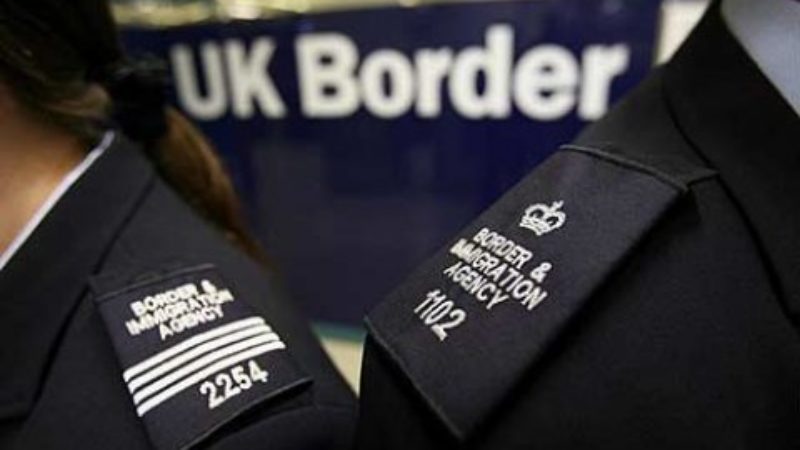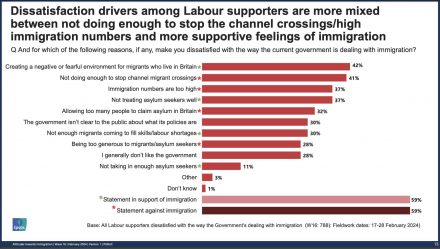
It is much easier to be Keir Starmer than Rishi Sunak when it comes to the campaign politics of immigration this year – an unusual statement to make when comparing Labour and Conservative leaders heading into an election.
Public satisfaction in the government’s handling of immigration has fallen to just 9% with dissatisfaction at 69%. This is the sixteenth wave of the regular Ipsos/British Future Immigration Attitudes Tracker since 2015 – and the lowest government satisfaction score it has yet recorded in that time.
Every party, including Labour, faces significant challenges of securing public trust on the issue. Yet the tracker data captures several areas of comparative political advantage over the Conservatives in this pre-election period.
While immigration is – overall – the public’s fourth priority issue, there is an increasingly wide partisan gulf over how much it matters. Most Conservative voters (53%) say it will be an important issue – making it a top three concern, yet it ranks in twelfth place for Labour voters.
Over a quarter of Labour voters (27%) say it will be a significant issue for their vote too – but it ranks behind the NHS, inflation and the cost of living, public services, crime, poverty, climate, energy policy, care for older people and trust in politicians when compared to other issues.
Labour more trusted on immigration than other parties, polls suggest
One more unusual feature of the 2024 campaign is that Keir Starmer is the first Labour leader in recent times to be more trusted on immigration than his opponent. It is not the case that the parties and politicians with the toughest voice or most restrictive policies are the most popular.
It is Labour, across Britain, who have the least negative reputation on immigration, trusted by 33% – while the SNP have better ratings in Scotland (39% trust) than the GB-wide parties have across Britain. Reform (with 26%) have similar levels of trust to the Liberal Democrats and Green Party (24%) – from very different groups of voters. The Conservatives trail on just 22%.
In opposition, Labour can find arguments that speak to a broad coalition of dissatisfaction, casting the government’s failure to stop the boats as ineffective, expensive and cruel to those with genuine asylum claims. In government, Labour would have to make choices and own the outcomes.

Starmer faces difficult balance as election looms
What can be overlooked is that the balance of political pressure on a Labour government would shift. Rishi Sunak’s political headache reflects his supporters’ frustrations that he has not delivered on two fronts – beyond not stopping the boats, most Conservatives would like to see overall net migration come down.
Keir Starmer’s political challenge is different. Labour’s poll lead shows that the party has managed to defy all the talk about a political “realignment” and reach across cultural and demographic divides. Winning marginal seats across England, Scotland and Wales – and seeking to retain them too – means the party has needed to win back moderately socially conservative swing votes, while securing the consent and support of more liberal voters, as well as what British Future identifies as the broad ‘balancer’ middle, which sees the pressures and gains of immigration.
The Ipsos data exemplifies Starmer’s balancer challenge.
Four out of ten Labour voters would like to cut immigration numbers, yet most declared themselves content with current levels of immigration, even when surveyed at a time when they are unusually high. A fifth of Labour voters want large reductions in numbers – and another fifth would like to see immigration go even higher.
Frustration over lack of control and lack of compassion among Labour voters
The number one reason for dissatisfaction with the government on immigration, among Labour voters, is that there is a hostile and unwelcoming environment for migrants, with worries about not enough being done to stop small boats in the Channel almost as popular.
If the critique from Conservative voters is that the government talked tough but failed to deliver, Labour voters are equally frustrated by a lack of control and a lack of compassion.
The quarter of the public with liberal views of immigration are on the fence about Keir Starmer on this issue, with 46% tending to trust him but 46% not doing so. The balancer middle of the public are more sceptical – with 36% trust and 51% mistrust.
Starmer’s unpopularity with the quarter of the public with the toughest anti-immigration views – where his 16% to 77% rating resembles that of Prime Minister Sunak – demonstrates the difficulty of Labour reaching beyond a broad balancer majority into the toughest section of the public.



More from LabourList
NEC member warns of CLP ‘resentment’ over twinning and cut-off IT access
‘A black hole, CQC woes, prison crisis: Tories get taste of their own medicine’
Labour NEC elections: ‘Councillors must have a voice and be listened to’